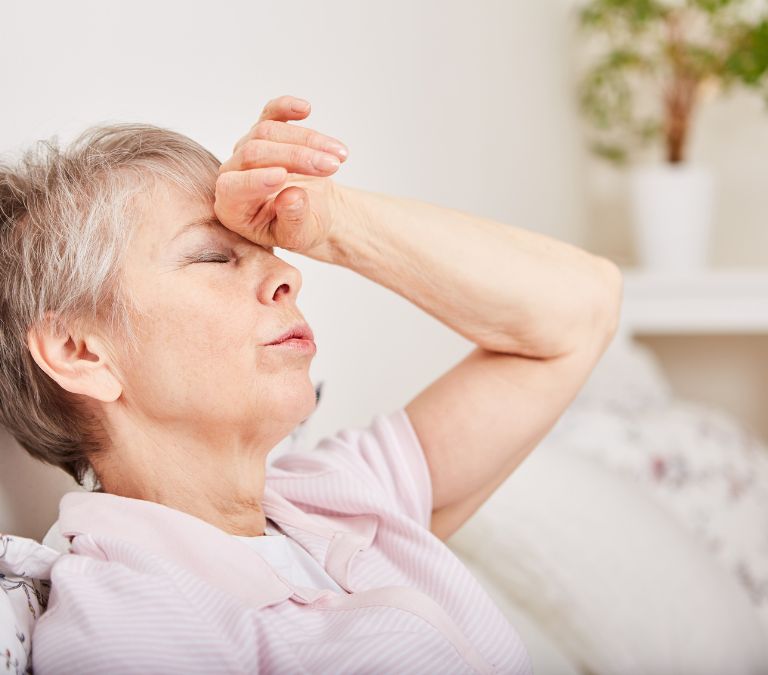If you’re familiar with the signs and symptoms of menopause, you may attribute any sickness or condition you have to menopause.
Symptoms, such as hot flashes, nausea, and dizziness, are prevalent during menopause, although not in all cases. Several additional conditions may cause you to suddenly feel dizzy, queasy, or have hot flashes.
Instead of making snappy judgments, think about what else could be causing these symptoms.
Hot Flashes
When experiencing hot flashes, the upper body is suddenly warmed, with the face, neck, and chest most affected. Like you’re blushing, the skin on your face may turn red. Sweating is another symptom of a hot flash. You may feel cold if you lose too much body heat. At night, you may suffer from hot flashes that impair your sleep.
The most frequent cause of hot flashes is menopause, which occurs when menstrual cycles become irregular and finally stop. Other medical disorders may also cause them. The most prevalent symptom of menopause is hot flashes.
Anxiety and a flushed look with red, blotchy skin are common with hot flashes, as are a rapid heartbeat, perspiration (mainly on the upper body), and a chilly feeling when the hot flash lets up.
Women’s experiences with hot flashes differ greatly. The length of a single episode might range from a few seconds to many minutes.
Even mild hot flashes might interfere with normal tasks. At any moment of the day or night, they can occur. If you suffer from nighttime hot flashes (or night sweats), they may wake you up and impair your sleep for the rest of your life.
It’s possible to get hot flashes when your body temperature rises. It can be caused by using warm blankets, a hot water bottle, or even a high temperature in the home. You may mistake your symptoms for hot flashes if you’re flushed and heated. Take a chilly shower to bring your body temperature back to a more comfortable level.
Stress hormones adrenaline and norepinephrine may be released by the body in response to emotional stimuli, causing a rise in blood flow and a warming feeling throughout the body. From stress to spinal cord lesions and migraine headaches, “flushing” can result in red and swollen parts of your body that feel excessively hot and flushed. Flushing may be caused by an allergic reaction to food or environmental factors.
If you’re a woman experiencing hot flashes, your doctor may conduct a blood test to determine whether or not your symptoms are related to menopause. Your doctor may suggest other tests and lifestyle adjustments if the results are inconsistent with menopause.
You can manage hot flashes in several ways.
Causes of Hot Flashes other than Menopause

Menopause and perimenopause can lead to hot flashes. However, there are additional factors that might lead to them, such as:
- Medical Illnesses like Rosacea.
- Hormonal and endocrine abnormalities (such as an overactive thyroid, Carcinoid syndrome, infection, and cancer). They suppress the organs’ ability to assist the body in operating properly.
- Hormone-secreting tumors like pancreatic tumors overpower body organs and can cause hot flashes and excessive perspiration.
- Anxiety
- Several illnesses with symptoms comparable to hot flashes and night sweats, including TB and HIV.
How to Treat Hot Flashes
Home Remedies
You may be able to control your hot flashes by making certain lifestyle changes.
- It may be necessary to alter the sleeping location if sweltering temperatures induce hot flashes. You should lower the thermostat to avoid overheating, use a fan to help with the airflow, wear light bed linens, and use a thin blanket.
- Sip a cool beverage if you feel a hot flash coming on. Also, keep an eye on what you eat and drink. Drinking caffeinated beverages, eating spicy meals, and consuming alcohol can cause heat flashes. Avoid your triggers by learning to identify and avoid them.
- Invest in mind-body therapy. Mind-body treatments may help some women with moderate hot flashes. Some practices include calm, deep breathing, meditation, stress management techniques, and guided visualization. Some of these methods may help alleviate the sleep disruptions common with hot flashes.
- Consider quitting smoking. Increased hot flashes have been connected to smoking. As a result of quitting smoking, you may be able to minimize your risk of several major health issues, including heart disease, stroke, and cancer.
- Shed some pounds when necessary. You can deal with hot flashes by lowering weight if you’re overweight or obese.
- Keep a calm head. Hot flashes can be triggered by little rises in your body’s core temperature.
Diet
Many people believe that organic supplements are safe to use. However, supplements might conflict with other drugs you’re taking for other medical issues, so it’s important to check with your doctor before taking any supplement. Always talk to your doctor about the medications you’re taking.
Dietary supplements can alleviate menopausal symptoms by using dietary supplements such as:
- Soy estrogen
Though plant estrogens haven’t been studied extensively, research into the potential benefits of certain soy compounds, such as genistein, is ongoing. Women who eat soy daily are less likely to have hot flashes and other menopausal symptoms. Soy’s estrogen-like chemicals might be one factor.
- Black cohosh
Many ladies use black cohosh to reduce hot flashes, and several studies have proven its effectiveness.
- Ginseng
Ginseng may not cure hot flashes, but it helps you manage them.
- Vitamin E
Vitamin E supplements may cure mild hot flashes.
Nausea

The feeling of having the want to vomit is known as nausea. Nausea can be acute, short-lived, or long-lasting. It is a debilitating symptom if it persists for an extended period. Vomiting and nausea might have a medical or psychological cause. Problems in the brain or the upper gastrointestinal system (esophagus, small intestine, stomach, liver, gallbladder, and pancreas) might cause nausea.
Diseases of various organs outside of the gastrointestinal system can also cause nausea. As a result, figuring out what’s causing persistent nausea may seem challenging. The vomiting area in the brain is responsible for both triggering the nauseous feeling and coordinating the vomiting action.
It’s common for people to have difficulty describing their feeling of nausea. Nausea feelings aren’t painful, but they’re unpleasant nonetheless. They’re felt in the chest, upper abdomen, or back of the throat. Other than vomiting, nausea can be linked to several factors.
A runny or stuffy nose, a high temperature, vomiting, and dizziness are symptoms that may accompany nausea.
Causes of Nausea
- Infections, diseases, and bacteria
An illness, a common virus, or a different infection can often cause stomach aches. Often, nausea and vomiting accompany stomach cramps and discomfort in the upper abdomen. You may be sick with a fever and chills. Noroviruses and rotaviruses are two of the most common viral infections. H. Pylori, a bacterium of the Helicobacter family, may potentially be a factor.
When nausea or vomiting and diarrhea occur simultaneously, it is known as gastroenteritis (gastroenteritis). This illness is caused by a viral infection that originates outside the stomach. The flu (influenza), a viral infection characterized by fever, chills, cough, and muscular discomfort, is not to be confused with this condition.
Nausea caused by food poisoning can be severe. Toxins generated by the bacterium Staphylococcus aureus are the most prevalent cause. After ingesting tainted or improperly cooked food, food poisoning symptoms manifest within a few hours. Listeria or Clostridium botulinum may also be the cause of food poisoning. Salmonella is the most common bacterial cause of food poisoning (botulism).
- Alcohol and smoking

Alcohol, smoking, and nonsteroidal anti-inflammatory medicines (NSAIDs) such as aspirin and ibuprofen can cause nausea and vomiting by irritating the stomach lining.
- Increased intracranial pressure as a result of disease or injuries like
- Toxicology (meningitis or encephalitis)
- Cancerous growth (benign or malignant)
- Trauma-induced edema of the brain (includes bleeding within the brain)
- Deficiency of electrolytes and consequent water imbalance in the blood
- Head injuries and concussions
Symptoms of brain irritation, such as a headache, nausea, vomiting, changes in vision, disorientation, difficulty focusing, and difficulty sleeping, can occur even if there is no evidence of bleeding or swelling in the brain.
- Odors or sounds
It is possible to experience nausea or vomiting due to certain odors or sounds. Trauma is also a factor.
Aside from the above, nausea can be caused by various other things, such as drug side effects and discomfort. It can also occur due to pregnancy and the morning sickness that comes with it, as well as seasickness and viral infections.
How to Treat Nausea
Home remedies and diet
- Avoid dehydration by resting the stomach and keeping it hydrated. Stressing the stomach may worsen nausea, so it’s important not to drink too much fluid all at once. The stomach may only accept one to two ounces of liquids at a time, taken every 10-15 minutes.
- For nausea and vomiting, it’s best to stay away from dairy products for the first 24-48 hours. Enzymes necessary for milk digestion can deplete in the small intestine if the infection spreads; This can lead to bloating, vomiting, and diarrhea due to a decreased tolerance to milk and milk-based products. Health care providers typically recommend foods like bananas and applesauce to assist the stomach in adjusting to a new diet.
- Take 250 milligrams (mg) of ground ginger root before meals and at bedtime to alleviate nausea during pregnancy, according to a study.
- Taking up to 250 mg of ginger every six hours can help women suffering from morning sickness caused by their pregnancy. Ginger has no negative effects at doses up to 1000 mg per day.
- Chemotherapy-induced nausea and vomiting may benefit from adding ginger to their treatment regimen. Research findings, on the other hand, have been contradictory. Several studies have found no difference in the effects of ginger and placebo. Several studies have shown that ginger can lessen some patients’ vomiting intensity and frequency.
- When it comes to post-operative nausea, peppermint essential oil has been shown to have a positive effect. The study involved 35 women who had given birth by cesarean section and felt sick.
Post-operative nausea may be reduced by breathing peppermint oil, according to a small study. More research is needed to corroborate this conclusion.
- Supplementing with vitamin B-6 when pregnant may help alleviate nausea. According to the results of a short trial, taking 25 mg every 8 hours was more beneficial than taking a placebo.
Dizziness
Dizziness is a broad term that can refer to various symptoms, and your experience with it may differ from that of another. There’s a good chance you’ll feel dizzy, weak, or faint. It’s possible that you’ll feel dizzy or as if you’re going to faint. Vertigo is a medical term for the sensation that the room is spinning.
People describe dizziness as:
- The false impression that you are moving when you are not
- Feeling dizzy or faint for no apparent reason
- Suddenly veering off course without warning or explanation.
- The sensation of floating through the air.
- Standing up, walking, or moving your head from side to side might exacerbate your dizziness.
When you suddenly feel dizzy, you’re more likely to suffer from extreme nausea. Feeling better after a dizzy episode might take anything from minutes to days.
Causes of Dizziness
- Low blood pressure (BP) and blood flow: The ability of your heart to pump blood throughout your body decreases with age. The abrupt decrease in blood pressure that might occur if you get up too soon can be dangerous. If your blood pressure changes, no dizziness should last more than a few minutes. Your dizziness subsides as your blood pressure returns to normal.
Decreased blood flow through your veins also reduces the oxygen your body receives. You may experience dizziness due to a lack of oxygen in your brain and inner ear.
- Conditions affecting the brain and nervous system: Dizziness can result from Parkinson’s disease and multiple sclerosis, which alter how your body functions. There are many possible causes of dizziness; therefore, your doctor will try to identify and treat the underlying problem.
- Medications: Medications should be read carefully, so be sure to do so. Anti-seizure meds, antidepressants, sedatives, and tranquilizers can all cause dizziness as a side effect. You may experience dizziness if you take medication to lower your blood pressure and your blood pressure falls too far.
- Anxiety: Fear of completing tasks or leaving the house may develop as you grow older. A panic attack, which frequently includes dizziness, can occur when you’re confronted with a situation that sets off your anxiety.
- Iron deficiency: Your body makes red blood cells with iron. If you’re anemic, you may have dizziness because your platelets are low. You may also feel weak and pale if you’re experiencing dizziness because of this disease.
- Hypoglycemia (low blood sugar): When your blood sugar decreases abruptly, dizziness might develop if you have diabetes treated by insulin. Feeling worried or sweating may also occur.
Dizziness is also caused by other medical conditions and lifestyles like:
- Internal bleeding
- Anemia (low red blood cell count)
- Prolonged bed rest, which weakens one’s muscles and makes standing difficult, can lead to infections.
- Conditions affecting other organs and systems due to dysfunction of hormone-producing organs such as the thyroid, pituitary gland, and other parathyroid glands.
- An allergic reaction may induce wheezing and a drop in blood pressure; it may also lead to sinusitis, which can cause dizziness.
- Hypotension that occurs after a meal (low blood pressure after eating).
How to treat dizziness
The treatment for dizziness varies greatly and is determined by the condition’s underlying cause. In many cases, dizziness is a sign of something more serious. You can alleviate the symptoms of dizziness by addressing the underlying cause.
Disorientation, drowsiness, and vertigo are symptoms of dizziness that can occur simultaneously or sequentially. It’s conceivable that the individual feels like they or the room is spinning, swaying, or whirling (possible vertigo).
You can treat dizziness with a variety of methods, including:
- Diagnosis of a major medical condition, such as a heart attack or stroke, may necessitate an immediate blood transfusion, intervention, or surgery.
- You can treat dehydration with intravenous fluids.
- Doctors may prescribe treatments for fever and infection to the patient.
- If the patient is short of breath or hyperventilating, they may be administered oxygen.
- If the results of your blood tests suggest that you have an electrolyte imbalance, you will be treated accordingly.
Home remedies to relieve dizziness

When someone complains of dizziness, it should be taken seriously and evaluated by a doctor to rule out more serious medical conditions or diseases. For dizziness, medical therapy depends on the reason and has to be assessed by a doctor.
There may be a need for a specialist’s services, or extremely specific tests, to find out what’s causing the dizziness and how to fix it. Diagnosing the cause of dizziness is effective when done as soon as possible.
You should take the following steps to ease mild dizziness.
- You need to drink plenty of water, eat frequently, and get plenty of rest to stay healthy.
- Standing up – gently might assist with the dizziness that comes from sudden shifts in posture.
- Anxious people who are dizzy might benefit from reassurance.
- Make sure your house is secure for someone who is always dizzy.
- Patients can benefit from using safety equipment such as handrails, a walker or cane, and bath mats.
- Keep rugs and carpets in place to reduce the risk of tripping and falling.
Diet
- Avoid beverages with a lot of sugar or salt, including soda and concentrated drinks, should be avoided. These foods are those that cause vertigo. Coffee, tea, chocolate, and energy drinks all contain caffeine. It could exacerbate the ringing that a person with vertigo disorder feels in their ears.
According to reports, caffeine depolarizes cells, making them more excitable. Meniere’s illness and vestibular migraine patients should limit their caffeine intake. The diet for a vestibular migraine is exclusively caffeine-free
- Avoid too much salt consumption. Salt makes the body retain more fluid than it needs, affecting pressure and fluid balance. Diets high in salt disrupt the vestibular system’s intrinsic equilibrium. Limiting salt intake is advised for those who suffer from dizziness.
Meniere’s disease and vestibular migraines since excessive salt consumption might worsen symptoms. Foods high in salt should be avoided, such as soy sauce, chips, popcorn, cheese, pickles, papad, and canned goods. You can use low sodium salt instead of conventional salt since sodium is the main cause of vertigo aggravation.
- Avoid nicotine and smoking. Blood vessels are known to narrow after using nicotine. The consumption of nicotine or smoking will make any vascular constriction-related vestibular issues worse. Nicotine hinders recovery by decreasing blood supply to the brain and causing vestibular compensation.
- Avoid drinking Alcohol. Alcohol harms metabolism and dehydrates the body. Its metabolites injure the brain and inner ear. In a person who is prone to vertigo, alcohol may cause severe vertigo attacks, migraines, vomiting, and nausea. Alcohol may disrupt the brain’s central processing, impair vestibular compensation, and influence cognitive functioning, harming the patient’s rehabilitation and worsening vertigo. Attacks of migraine are known to be triggered by wine.
Conclusion
When someone is sick, it is a clue that something more serious is going on. Antiemetic medications merely address the symptom of nausea and do not address the condition’s underlying cause.
Nausea and vomiting are common ailments that affect nearly everyone at some point. Nausea is more common in cancer patients and pregnant women.
Dizziness and perspiration might occur at the same time. Conditional causes for these symptoms include a wide range of illnesses. Some ailments aren’t life-threatening at all. But in other cases, like a heart attack, rapid medical assistance is required.
If your symptoms are recurrent, interfere with your daily activities, or cannot be explained by an existing ailment, you should see your doctor. It would help if you always treated other symptoms such as chest discomfort, difficulty breathing, severe headache, dizziness, and sweating with urgency.






